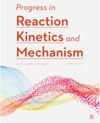1-降冰片基阳离子可能与2-降冰片基阳离子处于平衡状态
IF 2.1
4区 化学
Q3 CHEMISTRY, PHYSICAL
引用次数: 0
摘要
在稳定离子条件下,例如SbF5/SO2F2/SO2ClF,−80 oC下,2-Nb阳离子的1H和13C NMR 400 MHZ谱显示,除了通常的1H NMR共振δ 4.93, 2.82, 1.85外,还显示了从未见过的单重态δ 9.63和双重态δ 2.97 (j2,6 = 16.6 Hz),比值为1.00:1.07,提出这是由于共振稳定桥头堡1-Nb阳离子对映体与2-Nb阳离子平衡所致。对应的13C质子耦合核磁共振谱,−80 oC,具有C3,5,7三重态,δ 30.45, J(CH) = 139.14 Hz,和C4双重态,δ 37.7, J(CH) = 154.54 Hz。C1,2,6吸收δ 91.04相对较宽,而以前在- 70℃时,它是一个五联体。−80℃下13C质子解耦谱显示C4双重态和C3,5,7三重态坍缩成单重态,但C1,2,6共振仍然很宽。分析支持在≤-159℃时,共振稳定的对映体2-阳离子之间的交换减慢。提出了今后的研究方向。本文章由计算机程序翻译,如有差异,请以英文原文为准。
1-Norbornyl cation may be in equilibrium with 2-norbornyl cation
New 1H and 13C NMR 400 MHZ spectra of the 2-Nb cation under stable ion conditions, for example, in SbF5/SO2F2/SO2ClF, −80 oC, show besides the usual 1H NMR resonances at δ 4.93, 2.82, 1.85, the never before seen singlet, δ 9.63, and doublet, δ 2.97 (J2,6 = 16.6 Hz), ratio 1.00 : 1.07, proposed to be due to resonance-stabilized bridgehead 1-Nb cationic enantiomers in equilibrium with 2-Nb cation. The corresponding 13C proton-coupled NMR spectrum, −80 oC, has a C3,5,7 triplet, δ 30.45, J(CH) = 139.14 Hz, and C4 doublet, δ 37.7, J(CH) = 154.54 Hz. The C1,2,6 absorption, δ 91.04 is relatively broad, whereas previously, at −70 oC, it was a pentuplet. The 13C proton-decoupled spectrum at −80 oC shows the C4 doublet and C3,5,7 triplet collapsed to a singlet, but the C1,2,6 resonance is still broad. Analyses support the slowing exchange between resonance stabilized enantiomeric 2-cations at ≤ –159 oC. Some future studies are proposed.
求助全文
通过发布文献求助,成功后即可免费获取论文全文。
去求助
来源期刊
CiteScore
2.10
自引率
0.00%
发文量
5
审稿时长
2.3 months
期刊介绍:
The journal covers the fields of kinetics and mechanisms of chemical processes in the gas phase and solution of both simple and complex systems.

 求助内容:
求助内容: 应助结果提醒方式:
应助结果提醒方式:


